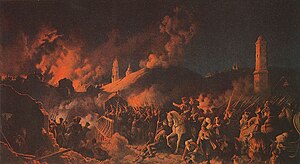Second Battle of Polotsk
| Second Battle of Polotsk | |||||||
|---|---|---|---|---|---|---|---|
| Part of French invasion of Russia (1812) | |||||||
 Battle of Polotsk, by Piter von Hess |
|||||||
|
|||||||
| Belligerents | |||||||
|
|
|
||||||
| Commanders and leaders | |||||||
| Prince Peter Wittgenstein | Laurent Gouvion Saint-Cyr | ||||||
| Strength | |||||||
| 31,000 regular troops, 9,000 militia, 9,000 regular troops operating independently; Total of: 49,000 |
23,000-27,000 | ||||||
| Casualties and losses | |||||||
| 8,000-12,500 | 8,000 | ||||||
The Second Battle of Polotsk (18–20 October 1812) took place during Napoleon's invasion of Russia. In this encounter the Russians under General Peter Wittgenstein attacked and defeated a Franco-Bavarian force under Laurent Gouvion Saint-Cyr. In the aftermath of this success, the Russians took Polotsk and dismantled Napoleon's operations in Belarus. Wittgenstein's victory set the stage for the Battle of Berezina in November, in which three Russian armies converged on Napoleon from separate directions.
While advancing on Moscow, Napoleon left a contingent of French and German troops at Polotsk to guard his northern flank against Wittgenstein. The French defensive bastion at Polotsk, alternately commanded by St. Cyr and Oudinot and located about 200 miles (320 km) east of the Polish border and about 150 miles (240 km) northwest of Smolensk, was extremely important to Napoleon for several reasons.
By establishing a firm front at Polotsk, Napoleon kept Wittgenstein's command at bay. It was critical to French interests that Wittgenstein not be allowed to march south, because such an advance by the Russians would lead to Napoleon's Grande Armée, hundreds of miles to the east, being exposed to an attack in its rear while it was engaging the main Russian army near Moscow. Such a development would sever the Grande Armée's communications with Europe and it would be at risk of being encircled.
Furthermore, the French position at Polotsk was important because it served to protect Vitebsk, which was one of three massive supply depots Napoleon had established in western part of Russian Empire (nowadays Belarus). These three supply depots—the other two being Minsk and Smolensk—were to fuel Napoleon's war effort in the winter should the Grande Armée need to continue the campaign longer than originally anticipated.
Throughout the summer and early fall of 1812, Russians and French were stalemated at Polotsk, which meant that St. Cyr's troops were accomplishing their objective of holding the "Dwina Line". The first battle of Polotsk, an inconclusive engagement fought in August, had the effect of keeping Wittgenstein's army at bay and was therefore considered a success by Napoleon.
...
Wikipedia
